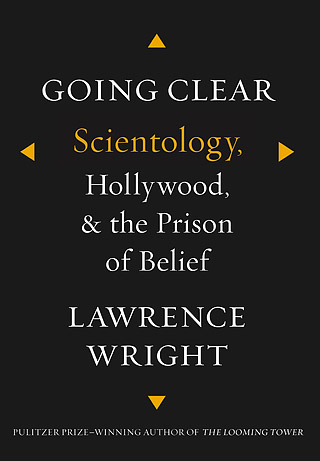Lawrence Wright‘s Going Clear: Scientology, Hollywood, and the Prison of Belief has been riding high on the New York Times list of best sellers since its release just a couple of weeks ago (you may remember my pointing you to generous excerpts in the Hollywood Reporter from the chapters on Tom Cruise and John Travolta). It’s been reviewed in the paper by Janet Maslin, and then Michael Kinsley‘s review landed on the cover of the Book Review: “That crunching sound you hear is Lawrence Wright bending over backward to be fair to Scientology. Every deceptive comparison with Mormonism and other religions is given a respectful hearing. Every ludicrous bit of church dogma is served up deadpan. This makes the book’s indictment that much more powerful.”
The Guardian‘s run more than one review as well, the first from Hadley Freeman, and then another from David Thomson, followed by yet another by Sukhdev Sandhu for the Observer—this despite the fact that no one in the UK has so far dared to publish it there. Sandhu: “Going Clear has been eagerly awaited following the Pulitzer prize-winning Wright’s 2011 New Yorker article about the church, which drew heavily on the testimony of Academy award-winning film-maker Paul (Crash) Haggis, a former Scientologist and father of two lesbian daughters who later recoiled from the church’s anti-gay theories. The book is diligently researched, calmly expository, and full of fascinating side-stories (most readers will be unaware of Hubbard’s fondness for the teachings of English occultist Aleister Crowley or his influence on the writings of William Burroughs)…. Most batty detail? Hubbard’s chronically awful thousand-page dystopia Battlefield Earth turns out to be Mitt Romney’s favorite novel.”
Hadley Freeman: “Hubbard had always been entranced by Hollywood but it was David Miscavige, the church’s current leader, who truly upped the celebrity ante, equating fame with a spiritual value and kowtowing to celebrities accordingly. Recently, on a trip to LA, a friend and I walked across the street to check out the Scientology Celebrity Centre” and “the most memorable part of the trip for me was the wall of photos of celebrities, as if the centre was one of those old New York delis, plastered with yellowing autographed photos of stars who have popped by for corned beef hash, so surely you want some, too? Scientology may not have many members, but it has an outsize presence due to wealth, fame and fear. It is, in its own dark ways, the inevitable religion to emerge from 20th-century America.”
In the Los Angeles Times, Evan Wright notes that “celebrities are serious business in Scientology. L. Ron Hubbard, who founded his church in Los Angeles in 1954, recognized their value in attracting followers. Through a church publication, he urged adherents to recruit Marlene Dietrich, Bob Hope and Walt Disney, advising them, ‘If you want one of these celebrities as your game, write us at once so the notable will be yours to hunt without interference.'”
Lawrence Levi, who’s reviewed Going Clear for Newsday, posts a delicious passage from the book describing “Hubbard’s misadventures in filmmaking.”
Paul Elie for the Wall Street Journal: “‘How can seemingly rational people subscribe to beliefs that others find incomprehensible?’ Mr. Wright asks. That is the $64,000 question in journalism about religion, and Mr. Wright explains that he sought to understand ‘the process of belief’ by writing this book. But his main text has a different emphasis. In it Scientology emerges as a secretive organization scarcely akin to the little church around the corner and one whose story poses reportorial challenges akin to those he faced in his Pulitzer Prize-winning 2004 book about al-Qaeda, The Looming Tower. It is a story of sad lives, power struggles, petty disputes, physical and mental conflict, and secrets kept and unkept.”
The Chicago Tribune runs a piece by Troy Jollimore in which he argues that “every religion constructs some species of ‘prison of belief’ for its followers, and most, in their fundamentalist forms, are just as dedicated as is Scientology to explaining away, or else simply denying, evidence that undermines their claims to authority. ‘There is no point in questioning Scientology’s standing as a religion,’ Wright concludes. ‘In the United States, the only opinion that really counts is that of the IRS; moreover, people do believe in the principles of Scientology and live within a community of faith—what else is required to accept it as such?’ What is most disturbing about Scientology is not what distinguishes it from other religions, but the resistance to criticism and objective evidence that it seems to share with them.”
Listening (28’34”). Wright’s a guest on Slate‘s Afterword podcast.
For news and tips throughout the day every day, follow @KeyframeDaily on Twitter and/or the RSS feed. Get Keyframe Daily in your inbox by signing in at fandor.com/daily.




